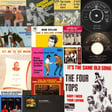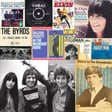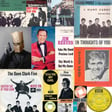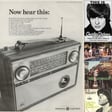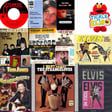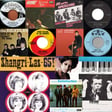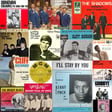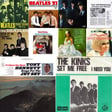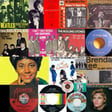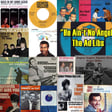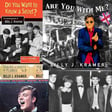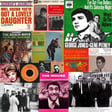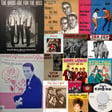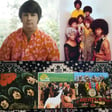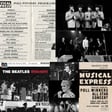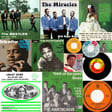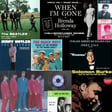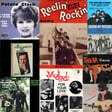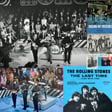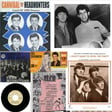Become a Creator today!Start creating today - Share your story with the world!
Start for free
00:00:00
00:00:01

October 1964 (side B)
Even if you've been told, time and time again! Side B of October 1964. Val Doonican rips off Dewey Cox. Jimmy Page talks about Shirley Bassey and her bra. Brian concerns himself with Tommy Quickly. Sha La La, and more while the Beatles take a minute to breathe. Happy Halloween, everybody! Support this podcast at the $6/month level on patreon to get extra content! Create your podcast today! #madeonzencastr
Recommended
Transcript
The Beatles' Cheer-Up Chant
00:00:00
Speaker
The Beatles had this chant John Paul and George and probably then Stuart and Pete had this chant when things weren't going well which in their world wasn't very often because mostly it was an upward trajectory but nonetheless sometimes you know a bad night or the gig we you know didn't work properly or the amps broke or whatever I say where are we going fellas and they'd go to the top Johnny and I say where's that fellas and they say to the top of most of the Papa most I said right Cheer up. I'd say, where are we going fellas? And they go to the top, Johnny. I'd say, where's that fellas? And they say, to the top of most of the papamos. And I'd say, right. And we'd all sort of cheer up.
Introduction to October 1964 Discussion
00:01:04
Speaker
Welcome to Side B of October of 1964 here on Toppermost of the Poppermost. I'm Ed Chin. I'm Kid O'Toole. And I'm Martin Kuber. So we start with the third week, the 15th to the 21st of October.
Exploring Shirley Bassey's 'Goldfinger'
00:01:20
Speaker
At number 34 is Goldfinger by Shirley Bassey, which would move from number 34 to number 27, a big song produced by George Martin. The horns are great. I do like the way that the Bond theme weaves in and out of this tune, although they could really only do that trick one time. I love that kiss of death from Mr.
00:01:42
Speaker
gold finger. And we will have a story about the recording of this song after your comments on it.
00:02:23
Speaker
What can you say? I mean, this is a classic. One of the best Bond themes of all time. Masterful arranging. I love those bombastic horns, as you said. The interweaving of the Bond theme throughout.
00:03:01
Speaker
voice could get easily overwhelmed by the bombastic horn. She never does. And kudos to John Barry, the conductor, yeah arranger, who arranges the music around her.
00:03:17
Speaker
So she is never overwhelmed. This is just perfection right here. And it's almost the whole plot of the film, the mood of the film. It's all encapsulated in this song. I hate to throw around the word iconic. It's so overused, but this is. It's iconic. What can you say? Well, this is the song that made the Bond theme a thing. Right. Yeah. It's the blueprint for what would be the classic Bond theme.
The Mystery of 'Goldfinger's' Recording Location
00:03:47
Speaker
a big production, orchestration and a vocal that almost makes the singer collapse from exhaustion on the end note. And always with the big Bond themes, it's that last note at the end. It's building up to that big, big note. You know, eventually you'll get Goldeneye with Tina Turner, even Rita Coolidge's all-time high. That ends up on a big note, which isn't a well-known Bond theme.
00:04:13
Speaker
So hold on tight, let them fly
00:04:41
Speaker
Alright, so there are several stories about the recording of the Goldfinger theme. The first comes to us from Vic Flick, who, as Marv just alluded to, tells us that Shirley Bassey was running out of breath while trying to reach the high note at the end of the song.
00:04:59
Speaker
So after consulting with her, she turns to John Berry and says, OK, I know what to do. So she slipped behind a studio partition, took her bra off and threw it over the top of the partition, then said, OK, let's take that last note again. in Yep. When the bra comes off, it's on. There you go. Take it from Kate.
00:05:29
Speaker
It reminds me of that Susanna Haas story where supposedly she sang one of the bangles tunes naked. Wow, okay. Because they convinced her that you'll get a better sound that way and she believed them, so.
00:05:44
Speaker
The other piece of this, Jimmy Page was the guitarist on that session. And so what Jimmy Page told GQ magazine, the full orchestra sounded absolutely amazing, but then Shirley Bassey arrived. She arrived with a friend, was very quiet, and then was asked to come out and sing. Then it took her just one take. At the end of the tape, she collapsed on the floor. She just held this one note and she basically ran out of breath and collapsed.
00:06:12
Speaker
You know how dramatic she usually is but with all the stuff she does with her hands, but this was even more dramatic. And I was in the front row of the musician, so I had a really good view of all of this. wow Wow. Now, the question we have is, Abbey Road likes to claim that that session was in Abbey Road. But Jimmy Page has said that that session was CTS. There is no documentation.
00:06:39
Speaker
For either studio, we do know that there was certainly a session for Goldfinger, which Shirley Bassey was at, at CTS. We also know that the orchestra was recorded at Studio One in Abbey Road, so... which is which and where this infamous session actually happened we don't exactly know but Abbey Road takes credit for it it's on their web page as such and in Mary McCartney's documentary If These Walls Could Sing they actually spend a significant chunk of time talking about Shirley Bassey recording Goldfinger in Abbey Road even though
00:07:18
Speaker
There's no guarantee. And I still put it at best about 55% probability that we're recording at Abbey Road. I heard the story about Goldfinger, but I wasn't sure. You know, we didn't have any interviews or something. You know, we hadn't found anything that actually um told the story. And then I could see from the recording sessions that Jimmy Page played guitar on the Goldfinger, John Barry Bond.
00:07:46
Speaker
session and they had the on the on the projection they had the end credits and Shirley Bassey had to hold that end note until the end credits had finished and she was like ah the story goes she collapsed on the floor she held the note but she gave it everything and she collapsed on the floor it, you know, afterwards. So it's this beautiful drama. I've heard conflicting accounts as well. And actually, the first recording of Goldfinger was like a demo by Anthony Newley, who co-wrote the lyrics. And John Berry conducted it, and they did two completed takes. John Berry later recalled that Anthony Newley gave a very, as he put it, creepy performance of the lyrics, which Berry considered terrific.
00:08:33
Speaker
but it was made purely as a demo for the film's makers, but that Anthony Newley did not want to sing it in the movie. It'd be interesting to hear the demo with Anthony Newley singing it.
00:08:46
Speaker
It's the kiss of death from Mr. Goldfinger Hmm,
00:09:18
Speaker
It was on a Bond theme collection. The creepier version of it, they were saying that it fits more with the original book because in the book Goldfinger himself was a bit of a creepy character, almost ohh sort of person that makes your skin crawl in some ways. So it sort of fitted with that. They thought when newly did it but then newly actually said that the only intention was to do it as a demo and they'd already got Shirley Bassey in mind for it and it was just a demo for Shirley to then listen to to get the general feel for the song before going and doing the full version but yeah being the filmmakers and John Barry they liked it but he just said no it's got to be Shirley that does it and he was completely right with that decision as well I think
00:10:05
Speaker
Oh, absolutely. She nailed it. At number 37, Three Little Words by the Applejacks, which would move from 37 to 32.
Mixed Reviews: The Applejacks and Heinz
00:10:14
Speaker
This is the Applejacks back to form, to my mind. It's a good version of a good song. Better than average Mersey beat. I really like those hand claps.
00:10:23
Speaker
There's some Beatles borrowed harmonies. The guitar is really good. The bass is back up front. The only downside is it is ever so slightly repetitive. Behind it is Mike Leander, and it was produced by Mike Smith. The writer of the song was Gordon Mills, who would go on to be responsible for the careers of artists as diverse as Tom Jones, Engelbert Humberdink, and Gilbert O. Sullivan. Oh, wow. Interesting.
00:11:17
Speaker
I ride to you today My love goes stronger I think you liked the song a lot better than I did. Boy, is this Beatles influence with the harmonies, the hand claps. They performed it well, enthusiastically, nice piano in it. But other than that, I just found it a kind of an average song, kind of cliche lyrics. I mean, it was fine. I didn't hate it or anything. And I agree, it got pretty repetitive. But yeah, I just thought it was okay.
00:11:51
Speaker
Standard pop with interesting syncopation in places, ah but not the best follow-up to what they've done so far. I think I might have liked to have seen them do something different with this to change what they were doing and find out what Megan, the bass player, would have sounded like as a singer on her own instead of um being everybody singing together.
00:12:13
Speaker
It's almost interesting to hear if she did it and she was singing it to her very soon to be husband in a sense, just as like a laid back song and see what that would be like. Oh, interesting. At number 39, a song that I believe we will all agree on. Questions I can't answer by Heinz, the baked beans man. This song would move from number 39 to number 41. The opening is stolen from Louie Louie and to a certain extent the whole songs is Heinz still can't sing.
00:12:46
Speaker
The backing is not good, the sax ending is overblown and played out, given all of its limitations. It's about as good as it could possibly be, which is not
00:13:12
Speaker
Oh boy, yeah, we can all agree on this. Sounds like garage rock, but not in a good way. Just sloppy and boy, he really can't sing. I mean, he tries, but he sounds so strained and oh, dumb lyrics, a repetitive beat. Joe Meek was trying to make him a star and this was another record that just showed he was not going to be a star at all.
00:13:39
Speaker
Apologies to fans of Joe Meek, which includes our listener Tim, a friend of mine. I think this is the worst Joe Meek production I've heard. Yeah. It's not good at all. The only thing I liked about this is the tone that they got on the Power Chord guitar stabs. That's the only thing I liked about it.
00:14:16
Speaker
But that's stolen from Louis Louis. Absolutely. But it's the only thing that's good about the whole song. Other than that, it's awful. The production is really bad and it's just not good. I mean, it does sound like it was recorded in someone's garage. Which it probably was knowing Mr. Meek. Yeah. This qualifies as as a contender for worst of 64. Yep. Agreed. But I don't much like the next song either.
00:14:42
Speaker
but Ed's gonna have fun with this. At number 42 is Walk Tall by Val Doonican. This song would move from number 42 to number 35.
Val Doonican's 'Walk Tall' and TV Influence
00:14:52
Speaker
Now those of you who've seen the biopic, the authorized story of Dewey Cox, how Val Doonican could go off and write such a blatant ripoff of Walk Hard is beyond me. Walk Hard is a great
00:15:43
Speaker
This one is not.
00:16:36
Speaker
Don Wayne just took whatever was good about Dewey Cox's song and just ruined it. All right. You guys comment. I will comment on ah how Dewey Cox is related to the Beatles at the end of our little segment here. Yeah.
00:16:54
Speaker
um Yeah, I'm gonna quote Don again, lesser Johnny Cash. I mean, this is this is like rip off kind of Johnny Cash. I mean, to me it sounded like a parody of a country song almost. It's like, let's take all the cliches of a country song, all the cliche lyrics and just throw them in one song.
00:17:19
Speaker
As I said, it was almost like, is this a parody? Now, marv the singer, I was looking up Val Doonigan and he was quite a star in the UK. He had his own television show and everything. He was yeah the British answer to Andy Williams in some ways.
00:17:38
Speaker
Yeah, well, I could see that because he even sounded a bit like him and I mean that kind of deep, easy voice. I could sort of see that kind of croony sound. So I could see that comparison. But yeah, I mean, wow. He had the show on BBC from 1965 to 1986. Wow. Long career. This was a big hit for him and nothing wrong with the way he sang it. I'm not blaming him, but wow. What a cliched song. Marv.
00:18:07
Speaker
An attempt at a cross between Andy Williams and Jim Reeves, but coming out sounding like that uncle that you wish would stop singing at the family get-togethers after they've had far too many rum and cokes.
00:18:23
Speaker
Good summary. There we go there you go. You've been waiting for that one, haven't you? Yeah, I was waiting. And now Ed's going to tell us how much better Dewey Cox is. Go on, Ed. Yeah. Walkhard deserves its place in rock and roll history. But if you've seen the Walkhard biopic, it is true that Dewey Cox did indeed meet the Beatles in India with the Maharishi. You know, I don't know why Dewey's not in any of those pictures, but he was there. We know that.
00:18:53
Speaker
So as told in the film, John and Paul offered Dewey some LSD. And that would be the beginning of the next part of Dewey Cox's career, where he kind of went. That's like a Delic route. Jim Morrison route, but we won't go there. But.
00:19:13
Speaker
Yes, Dewey was there and his band was there and they did indeed hang out with the Maharishi. I don't know if Jack Black was necessarily the best choice to play Paul McCartney in the biopic, but hey, it's got to be better than certain other biopics we've seen. Where are the Beatles, anyone? Yeah, right.
00:19:34
Speaker
Go and find the DVD. I don't know if it's streaming the last time I checked. It isn't, but it is around.
Manford Man and The Rockin' Berries
00:19:40
Speaker
You can find the film. It's very much a film worth seeing. R.I.P. Dewey Cox. Yep. Thank you for the music. Yep. They're going to give Dewey the Lifetime Achievement Award next month.
00:19:56
Speaker
The Lifetime Achievement Award. Baby, that's wonderful.
00:20:30
Speaker
at number 43, Sha-La-La by Manford Man, which would move all the way from number 43 to number 18. It's a good pop song. I like the keyboard. I don't really have that much else to say about it. The cash box review of it, they described it as a delightful rockarithmic beat refitting of the Shirelles few seasons back click. Perfect cash box review. Rockarithmic, I love it.
00:21:33
Speaker
This was not in the same league as Duwad Diddy. Yes, it's a silly lyric, but Duwad Diddy was used sparingly enough that, to me, it didn't get annoying, but Shalala, to me, was a bit more annoying. And I get it. It's supposed to be a pop song to sing along with, but I could predict the next line every time. These lyrics were definitely not original, and I found the keyboard parts annoying after a while. This just didn't do it for me. Not a great follow-up to do one, did he? I'm sort of in the middle of both of you. I think it's one of the Lesser Shirelles songs. I'm not sure about John Burgess's production on it, to be honest, but it's okay. He's bordering on his production that he does with Freddie and the Dreamers and Adam Faith, not allowing it to rock out a bit more than it needs to.
00:22:28
Speaker
And the Shirelles original was covered on the US side back in March. The charts were drowning in Beatles at that point in time, but that is where that song was and we did mention it. So go back and listen to our March US side.
00:22:44
Speaker
At number 44, back again, our friends, the Rockin' Berries with the Goffin' King song. Another cover, the original was by the tokens. The tokens version was just out of the charts. The last week it was in the charts on the billboard side was the last week in September. Here we are in October. As Marv mentioned, the Rockin' Berries said, we've got to cover this fast. And they did. Backing vocals are Beach Boys inspired. I kind of like the guitar but it gets a little bit intrusive. The drums are nicely recorded but unfortunately not played terribly well. I like the shaker and percussion. It's okay. Yeah.
00:23:42
Speaker
According to one of the band members, PJ Proby invited the band to a party and a friend of PJ Proby's, Kim Fowley, said he had found just the song to suit their style and it was, He's in Town. We've had Kim Fowley show up a lot recently in the past. Yes, indeed.
00:24:00
Speaker
I was amazed to hear that Kim Fally was part of the Revival 69. I know. He turns up in the most unusual places. I like this one better than the other Rockin' Berries track we had. I think the harmonies work better here. Yeah, definitely Beach Boys inspired, as you said. Not as good as Beach Boys for sure.
00:24:20
Speaker
It's a decent track, decent cover, but still not outstanding. I wouldn't exactly call this absolutely super memorable. and Their harmonies work better here than on the other. It is basic arrangement-wise and a basic recording in comparison to the original by the tokens. I like the version by the tokens a lot. Have we discussed the tokens before, Ed?
00:24:48
Speaker
And we have mentioned the tokens that we haven't really said that much about them. Like I said, we kind of skipped over the song over on the American side because we had a cash box month in August and it wasn't in the cash box charts then. And then we just had too many songs in September. So this was one of the ones that we skipped the tokens. Of course, they're best known for Lion Sleeps tonight. And we yeah ah spoke briefly of that when we talked about the cover of Weemawe that was in the British charts. Yeah.
00:25:14
Speaker
But tell us more about the tokens, Marv. Yeah, the tokens that they were a group from Brooklyn, they were signed in 55, and their original members included Neil Sadaka, but they didn't get very much success in the 50s. When it came to around 1960, Neil had left some of the songs he was writing, he was giving away and getting some interest with, so he went and became a songwriter for hire.
00:25:40
Speaker
working at the Brill Building with other people such as, you know, Carole King and Goffin and all these other people.
00:25:48
Speaker
I was in the chorus in my high school and this kid was sitting next to me. His name was Neil Sadaka. And he started this rock and roll group. And we made a few records and we did a couple of TV shows back when I was only about 16 years old. And after a while we broke up and Sadaka went on his own and we reformed the tokens again. And that started our career off. Tonight I fell in love, our first big hit record.
00:26:31
Speaker
I want the stars above. Very complicated lyrics. Anybody can relate to those kind of lyrics. You know, I fell in love, I want the stars above to know tonight, I fell in love. But those were the songs back then.
00:26:45
Speaker
that was a you know That was a big hit, but you know that was a one hit. Who knows who knew what was going to happen after that record? We didn't want to be a one-hit wonder, as they call them. know And our contract was almost going to be over. And we went up to our producers and they asked us, what else do we have? And I started to sing Wim away. And they said, well, that's that's very unusual. We recorded the song.
00:27:09
Speaker
It was a very strange record for the time, which I still think it is for this time. It's still very unique. And the other guys in the group didn't want that record to come out. They thought it was too weird. It's never going to happen. ah But you know I said, I think it has a shot. And and and I think it would it could be a commercial success.
00:27:35
Speaker
We were at a meeting at RCA Victor and the president of RCA Victor called us up to his office. He said, I'm going to send, um I'm sending you guys to Rome to do a show in Rome. So we all thought we're going to Rome, New York, you know, Rome, Italy. We did a big, big TV show and the biggest variety show all over Europe. It was called Studio One. It's an interesting story that's got lots of people involved.
00:27:59
Speaker
At number 46, it hurts to be in love by Gene Pitney, which would move from 46 to 36.
Peter, Paul, and Mary's Dylan Cover
00:28:06
Speaker
At number 47, the times they are changing by Peter, Paul, and Mary, which we would move from number 47 to number 44. We will be having a supercut of this song. This is one of those iconic songs that we have to do a supercut version of. However, Dylan's version is so iconic that To me, the Peter Paul and Mary version kind of does it a disservice. The harmonies don't really suit the song all that well. The arrangement is too pretty. It does get better as the vocal gets a bit more intense, but then it just falls back.
00:29:17
Speaker
Peter, Paul and Mary, beautiful harmonies. They don't suit this. Dylan's vocals are a call to arms. That is the correct tone for this song. This is a ah song that's meant to be delivered in an almost defiant way and this arrangement and their vocals are just too pretty and delicate for the lyrics. It just doesn't match. It's beautiful. I mean, their harmonies are just lovely, but it just doesn't suit the subject of the lyrics. Dylan's original is just unsurpassed.
00:29:55
Speaker
It's what it is. It's a poppy folk trio doing a cover version of Dylan. We've talked about that before an now as well. I think there's better versions of this by them live, to be honest. I think they put more emotion into the piece there. ah But I will always fall back to the Bob Dylan original because I'm a huge fan of Bob Dylan. It's all right. It gets the song out into the charts for the people that have a problem with Bob's voice, I suppose. But it doesn't have that every man appeal that Bob's voice gives it to my mind. Right. A lot of artists have covered this song and we do indeed have a supercut coming as I mentioned off the top here. We've got Bruce Springsteen doing his cover of Times They Are Changing.
00:30:42
Speaker
Tracy Chapman and you know, not all these are represented here but I do want to mention some of the other artists who have also covered the song. Simon and Garfunkel covered the song. The Seekers covered the song. The Silky covered the song. The Birds covered it. The Beach Boys covered it. Yes.
00:31:01
Speaker
Oh, wow. Share covered it in 1967. Not in the supercut, Burl Ives and Lester Flatt. Not together, separately. Burl Ives covered it in June of 68 and Lester Flatt and Earl Scruggs covered it in December of 68. Nita Simone covered it in June of 69. The Hollies covered it in 1969. Josephine Baker covered it. Billy Joel covered it in Russia. Oh yeah, I forgot about that. That's right.
00:31:30
Speaker
That's kind of a cool version. Yeah. Phil Collins covered it in what is a very weird 80s version of Times They Are A Chaney. Manford Man's Earth Band covered it. There are a lot of different versions of it. Listen to the super cut, see if you can figure out who we've mentioned and who we haven't mentioned.
00:31:51
Speaker
Come gather round people wherever you roam.
The Success of 'Baby Love' by The Supremes
00:37:37
Speaker
Moving on to the last week of October, the 22nd to the 28th of October. At number 24 is Baby Love by the Supremes, which is simultaneously on the US charts. It will top the charts on both sides of the pond. This was very gaudy.
00:37:59
Speaker
ah insisting on a follow-up chart topper from Holland-Dosier Holland. So that's why this sounds a little bit like Where Did Our Love Go, but even so, it's still an original song. Diana Ross's cooing-style lead vocal, the Baby Baby backup from Florence Ballard and Mary Wilson, and the Funk Brothers. All of that is common to both records, but this still sounds quite different from Where Did Our Love Go to my mind.
00:38:26
Speaker
Absolutely. Another Holland-Dozier-Holland hit. And it's interesting. but The first version, which you can find and on YouTube, had been recorded about three weeks earlier than the revised version on July 24, 1964. And when they presented it to Barry Gordy, he said, it's great, but there's just no life here.
00:39:09
Speaker
b Brian Holland's recollection was a little different. He said that Barry Gordy's pronouncement wasn't what made them decide to rerecord the song. He claimed that Holland-Dosier Holland had come to that conclusion anyway. It didn't have that beginning.
00:39:36
Speaker
and it was a slower tempo.
00:39:46
Speaker
And when you listen to it, you can really hear it. It just doesn't have the same pizzazz that the final version has. So they went back, Screams and the Funk Brothers rerecorded it, and Dinah Ross ad-libbed that beginning little cooing. And they sped up the tempo, and that's what you hear now.
00:40:29
Speaker
What a song really has that catchiness to it. And Dinah Ross's flirty kind of vocals that purr, it's just perfect. And of course the backing vocals of Mary Wilson and Florence Ballard, they were just perfect. It's just the essence of a great Motown pop soul record. And once again, the end of the no hits of frames.
00:40:56
Speaker
Yep. And from here on in, you would only have Diana Ross doing the lead vocal on any of their singles. One of the great Motown songs. Apparently the 74th most played wow soul song on Amazon Music. There you go. I found that out today because somebody listened to it on Amazon Music. If you want to give us some money, we're open to that sponsorship.
00:41:26
Speaker
To me, it is like a step up from where did our love go? It's like we were saying with the Beatles how every song was a step up or a next level. I'm going to do a throwback here. Last month, I spoke about the Holland dozy Holland team working well together when we were speaking about the Eddie Holland song.
00:41:59
Speaker
We were talking about that and during that song, I said that that would have been better mixing the smooth and the biting lyrics together, which this has got. It's got that smooth in there, but it's also some of the lyrics are a bit biting at the same time. It's got that mix of those two, which I think works perfectly with that back end of the music. It's fantastic. A message to the lady in the narrative though. If this guy makes you feel that bad, I think you'd do yourself a favour by finding somebody who will dote on you a bit more and treat you like a princess. That's very true. Another thing I want to point out here is how far Holland does your Holland have come in terms of writing hit songs.
00:42:40
Speaker
Baby Love, okay? Just two words, two simple words. They've come a long way from the No Hit Supremes years when they wrote, when the love light starts shining through his eyes. Wordy, who remembers that? But this Baby Love and the whistle lyrics are very straightforward too. This is easy to remember, you can sing along with it and you've got a hit.
00:43:07
Speaker
Absolutely. Yeah, it's eight letters. And despite the length of the Holland-Dozier-Holland title, it's still not as long as the title of the song Smokey wrote for the Supremes. A breathtaking, first sight, soul-shaking, one-night, love-making, next day, heartbreaking guy.
00:43:26
Speaker
It rolls off the tongue. Again, simplicity works. And I did have one, maybe, but not quite so much Beatles connection. You know, the Beatles were recording the 64 Christmas message right around this time, late October of 1964. Now, as we all remember from the Christmas message, you get that stomping feet going into jingle bells.
00:44:08
Speaker
Do you think they were taking the Mickey out of the Supremes? It's just a little bit reminiscent of the stomping feet from both this and Where Did Our Love Go, don't you think? Could be.
00:44:23
Speaker
I think it's more of a tasteful nod as opposed to a Mickey take. Maybe it was a homage. Yeah. It's not like walk tall and walk hard, huh? Right. That's true. All right.
Innovations in Pop Music: Dave Clark Five and More
00:44:41
Speaker
We move on to number 33. Anyway, you want it by the Dave Clark five. Other than the horns, this feels to me kind of like Dave Clark five taking a page from the Beatles playbook call and response vocals. I liked that little echo effects, which are actually surprisingly forward looking. It's not something you would guess from the Dave Clark five catalog. It's just amazing to me how many hits the Dave Clark Five had. You kind of forget how many they had. This is another one where I didn't recognize it immediately from the title, but as soon as I heard it, I thought, oh yeah, this one. This is another one I used to hear Dick Biondi play on Magic 104 here in Chicago. And it does stand out with that reverb. And it is forward-looking. It really stands out. You've got those booming drums, of course, of Dave Park Five, Trademark, The Call and Response. It does sound a bit Beatles-esque, particularly in the chord changes in the bridge. I wouldn't say it's one of their top-tier singles, but the stomping drums, the harmonies, the echoing effect, and the catchy chorus. I think all of that win the day. It's a fun record. I like it.
00:46:01
Speaker
Don't the guitars sound almost grungy? Yeah, they do. Almost. Yeah. Almost. It's very different for Dave. It's almost like they're on a trajectory and they're trying to change as well. It's amazing how much they put out considering that most of it is self-penned and self-produced as well.
00:46:21
Speaker
Because Dave wrote and produced this. Yes. And kudos to them for trying to change their sound. you know in different ways, because this is one of those records where you don't automatically think, except for the drums, that it's a Dave Clark Five song. That's true. And as an aside for just how popular the Dave Clark Five were, recently there was a thread on Facebook. Not only were there the Remco Beatles dolls, but there were very similar dolls made of the Stones and of the Dave Clark Five. Wow. That's pretty nuts, actually. Yeah, my gosh.
00:46:55
Speaker
I want the one with the saxophone in. That'd be fun. There is indeed one with a saxophone. Cool. At number 34, Google eyes by the Nashville teens. No, Darren Murphy did not visit them from the future and tell them about Google the search engine. I'm not sure what I think about this song. It's a lot of lyrics being spit out very quickly. Brown eyed handsome man style. This is a John D. Loudermilk song from 1962.
00:47:48
Speaker
some of the lyrics, jump in the old Jeep wagon, bump it to the banks of the river, dig me a worm and a cricket squirm and a wade out into I the water. Oh, goodbye, Google. I eat them up a jump out of Google. I eat them up a Google. I Google Google. your booth, go back from the water. I Goodbye Google I so it's about a guy going fishing for dinner. It's an okay song It's a more country than I might have expected. Although the national teams were a pretty country group. I like the guitar I like the drums but all in all it's kind of just okay
00:48:22
Speaker
I went down a little bit of a rabbit hole with this because I kept thinking, is this some kind of child's game? Or because I kept thinking like Queenie Eye. Queenie Eye. So I started going down a rabbit hole. Could this be based? No, I guess not. You know, I think this was just John D. Lauterbroek having fun with words and just coming up with something silly. I like the backing track. I like the acoustic feel to it, as you said, a little bit of a country feel.
00:48:51
Speaker
It's kind of fun, kind of silly. Yeah, not sure what I think of this either, but I guess if you look at it from this kind of a light novelty feel to it, I guess it's okay. I like the backing track better than the lyrics. Mickey Mouse production, who we know from working with the animals. In places, it's almost like his voice is veering towards an epic burden, but not quite reaching that.
00:49:19
Speaker
and It's going toward that rock, but it's nowhere near in that range. No, it's not, but it's trying to get there. yeah It's a pretty standard cover. It's okay. The B-side written by the keyboard player John Hawken, that's actually better. TNT is a great song, the B-side. Check it out.
00:49:36
Speaker
At number 38, Losing You by Dusty Springfield, another song by her brother. It's a good lead vocal, but the song doesn't really take advantage of Dusty's strengths, which is a little bit weird considering who wrote it. The backing singers veered toward that screaming girl's territory.
00:50:21
Speaker
She sings it beautifully, soulfully. I mean, it's Dusty Springfield. What do you expect? But the song just isn't distinctive. The song is over range. And at the end, particularly, the horns and the strings are so over the top. That's a badly recorded orchestra.
00:50:37
Speaker
and Dusty fights to be heard over everything, including the backing singers. It's like the song ends and the song is trying to reach some kind of a climactic moment and the song just doesn't really go anywhere. It's just kind of an average song and poor Dusty's trying her best to make something out of it. I don't think it's a very good production by John Frans. The Arrangement by Ivor Raymond, who did previous songs, arrangements as well. That's a bit over the top. And yeah, the production, like I said in the arrangement, if they pulled all the orchestration back and all the arrangement back and pulled their voice up, then you'd hear what's going on. But occasionally you don't know what she's singing. And it's strange for a voice as powerful as Dusty's voice.
00:51:23
Speaker
Because you can't hear it above the huge instrumentation that, in times, it's almost like it's an instrumental. A voice is that far back in the mix. agreed It's another song that really could have been served much better by a George Martin tasteful mix. yeah ye
Critiques of The Honeycombs and Baron Knights
00:51:41
Speaker
Yeah. When she works with Bacharach and David, she has a much better recorded orchestra and instrumentation in the background and her voice shines on those. Yep. Agreed. At number 40, is it because by the Honeycombs, another not great song, more annoying guitar. It's got the Dave Clark five stomps in the middle there. The hand claps want to be Beatles inspired, but don't work here. And then there's more Telstar organ on the fade. Miss.
00:52:34
Speaker
I'm going to quote Betty here. and She had more than just one sentence to say. That was a terrible, terrible song. It offended my ears. It's like they threw everything they could think of into it. There was no point to the song. We don't need to comment anymore, do we?
00:52:53
Speaker
She summarized it, didn't she? That was pretty good. Yeah, too much reverb on the guitar. The growling vocals got on my nerves. The Telstar organ, ugh. To me, the lead singer at times tried to sound like Paul Anka and then at other times the growling. I don't know if he was trying to get something going. Knew this was a terrible song and tried to get some soul into it and ugh.
00:53:20
Speaker
What can I say? Betty nailed it. No point to the song. A follow up to have either right that doesn't have the right to follow up. not son Yep. And the drums are buried. I mean, the drums probably would have been the best part of the song, but you can barely hear them through the den. That's my girl on the drums. yeah At number 42, come to the dance by the Baron Knights. The original version of the song was by the four preps in 1962. The backing is good, but the song isn't all that strong. And then it ends with that whistling, which is just corny. Oh, that whistling drove me crazy. Yeah. At the beginning and the end.
00:54:20
Speaker
I listened to the four preps original yeah and I wasn't insane about the song overall. I mean it sounds like something out of music hall and I liked The four preps version, at least their harmonies, they had less annoying backing on it. but They had horns. It was like a Broadway show arrangement. So I felt like their version was definitely superior to this. It just didn't work as sort of a rock arrangement. And yeah, that whistling. I don't know whose idea that was, but it sure didn't work.
00:55:19
Speaker
Wow. The Baron Knights are trying to do a natural proper song that isn't a parody. And not succeeding at it. No. No. And still coming out sounding like a group of people that you'll find on stage in a club. Yes. You could do a club or something. And these people are there doing these jokey songs and occasionally throwing a song that you might vaguely remember, although To be honest, this isn't one of the best four preps songs for anybody to cover anyway. No, I agree. Definitely not one of the rest. No. At number 46, Wild Side of Life by Tommy Quickly and the Remo 4. This is a surprisingly good track. I have never really had that much respect for Tommy Quickly. tip of my tongue just turned me off of Tommy so badly. Giving Tommy that song was definitely a pretty big mistake on Brian Epstein's part. It's not a great song but it's a good bluesy little number here and that seems to be what he excelled at. Brian really never should have tried to turn him into Billy J Kramer. Oh for sure, I agree.
00:56:51
Speaker
I think I prefer the country version of this. It is a country song. It was made famous by the country singer Hank Thompson, was originally released in 1952. It actually became one of the most popular recordings in country history. It spent 15 weeks at number one in the Billboard Country Chart.
00:57:12
Speaker
And you can definitely hear the country twang in this a bit. It's not overly obvious, but you can still hear it in this. I think it just works better as a country song than in a rock arrangement, personally. But Tommy sings it fine. yeah I agree. I like this better than Tip of My Tongue. No doubt about it. But I just think I prefer it as a country song than as a rock song. My personal taste, Marv.
00:57:37
Speaker
Yep. I like the version that you mentioned. I found an earlier version than that by Jimmy Heap and the Melody Masters in 1951. And that's also a country song. Oh, I'll have to check that out. That's good. But the version that you mentioned is better than that. But I do like that one that I found in 1951 as well. yeah It's more of a British contemporary rock band approach to it. I think his voice works better here for sure. And earlier on, Tip of My Ton, was a mismatch. And it's a very rare case of Brian not owning in on what was right for the artist. In that case,
00:58:14
Speaker
It was a mismatch originally and this in the arrangement fits his voice a lot more.
Tommy Quickly's Bluesy Transformation
00:58:20
Speaker
It had a bit more grip to his voice than they were trying to get originally. Yep. So Tommy Quigley, when he was still Tommy Quigley, Q-U-I-G-L-E-Y, was playing with a band called the Challengers.
00:58:35
Speaker
Brian signed him and paired him with the Remo 4 because he did not care for the challengers. Tommy would be promoted as one of the highlights of the NEM stable, although George Martin never really cared for Tommy Quickly or his style. Also changing the name to Quickly, was he trying to do a Larry Parnes here? I thought that as well when I saw his name, yeah.
00:59:00
Speaker
Perhaps he'd have got a time machine and he saw those films with Tom Selleck from the 80s, you know, Quigley Down Under. Oh, yeah. After Tip of My Tongue, Tommy Quigley or Tommy Quigley would have four flop singles. The fifth single after Tip of My Tongue, Wild Side of Life, would make the top 40. And so we'll get to that in a bit. After that, Quigley was offered no reply. Oh, wow.
00:59:27
Speaker
So, it is unknown whether the Beatles had intended to record their own version at that point, but when Quickly did not record it, they absolutely went and recorded it. Not surprised. Just on a bit of a tangent, are there any songs that the Beatles gave out around this time that you think would have been better suited to Tommy?
00:59:48
Speaker
who You know what to do? Might not have been a bad song for Tommy quickly. Cause that's got a little bit of of that grid, a little bit of that R and B. You rock it up a little bit and that might've worked for him. Possibly. It's a little bit slower. It's a little bit bluesier. That's possible. And it would have given George a little bump in the pay packet there.
01:00:09
Speaker
There you go. Tommy quickly and the Remo 4 can be seen performing Humpty Dumpty in the 1965 film, Pop Gear slash Gogo Mania here in the States, which we have spoken of in the past and is available on DVD and Blu-ray. Cool. We're going to end on a song that I love. Me too. We close out the British charts for October of 1964 with one that we all agree is a real banger. yeahp Yeah. Don't bring me down by the pretty things.
Celebrating The Pretty Things and The Beatles' Slogan
01:00:42
Speaker
The more the pretty things I hear, the more I got to go, why weren't these guys bigger? And if you'll go back and listen to the our previous mention of the pretty things, every rock band there is since more or less says, yeah, no, no, the pretty things were the real thing and the stones were jealous of the pretty things. And this just continues that trend.
01:01:06
Speaker
This is a great record. It's another Stones but dirtier track. I love the lead guitar. I love the R and&B slash Pop Harmonica. I love the bass playing on this. It's a great record. Oh, it really is. Americans, we slept on this band. What were we thinking? Now we're talking.
01:01:37
Speaker
Spinning round, don't wear me down
01:02:02
Speaker
Love the blues feel on this. What a vocalist Phil May was. Definitely see why Mick Jagger was jealous of this band. They really knew how to incorporate pure blues with pop. I mean, that is so obvious. They were the real thing. So I said, why weren't they bigger? I don't get it. This is incredible.
01:02:24
Speaker
Yep, it's the stones with more dirt in there and more grit. And this is actually a good song that's written by, we've already mentioned him, John D. Loudermilk wrote this.
01:02:36
Speaker
under the yeah pseudonym of Johnny Dee, which he would write many songs now at this point onwards, he would write under that name quite a lot. Fantastic, great version of the song. I love everything about it. The harmonica on there is superb. c Incredible. It's just amazing, really good. I might even say that so far, I think this is better than what the Stones have put out that we've talked about.
01:03:03
Speaker
They are definitely neck and neck with the stones. No doubt about it. Well, that may be really what caused Mick and Keith to say, you know, look, these guys are better than we are. We got to write our own stuff because satisfaction was probably in the creation stage at this point. yeah Yeah, it may well been this record. It's like, oh, we got to do something. Because I mean there really was a bit of a change and we know from as tears go by that the stones were starting to write But that may have really been like kick making keys into full writing mode Well, I can definitely see why pretty things made them nervous. They should have been much bigger
01:03:45
Speaker
Mm. Unbelievable. that They didn't get any bigger than they did. Yep. Well, and the fact that really, if it weren't for shows like this, no one really remembers them other than the rock star types, the folks who are really hardcore musos. Yep. Unbelievable. All right. We will be back soon with side C as we dive into the American charts for October of 1964. Happy Halloween, everybody. Don't get too scared.
01:04:15
Speaker
bo See you next time!
01:04:39
Speaker
There was a piece in the NME, a news piece, that said the top rank records, remember when top rank had a record label? And they introduced an LP series next week that will be called Toppermost. And it's coinciding with their current advertising slogan, Toppermost of the Poppermost. Yes, and thought, they got it from somewhere. They saw that, they must have seen that in either the NME or record mirror or disc, record and show mirror as it was then.
01:05:07
Speaker
And they've taken it from there. They've obviously thought how stupid that is. How stupid is, it's one of those phrases that someone, an older person who doesn't understand teenagers comes up with a slogan that they think is going to be the hip slogan of the month. Topper most of the popper most.
